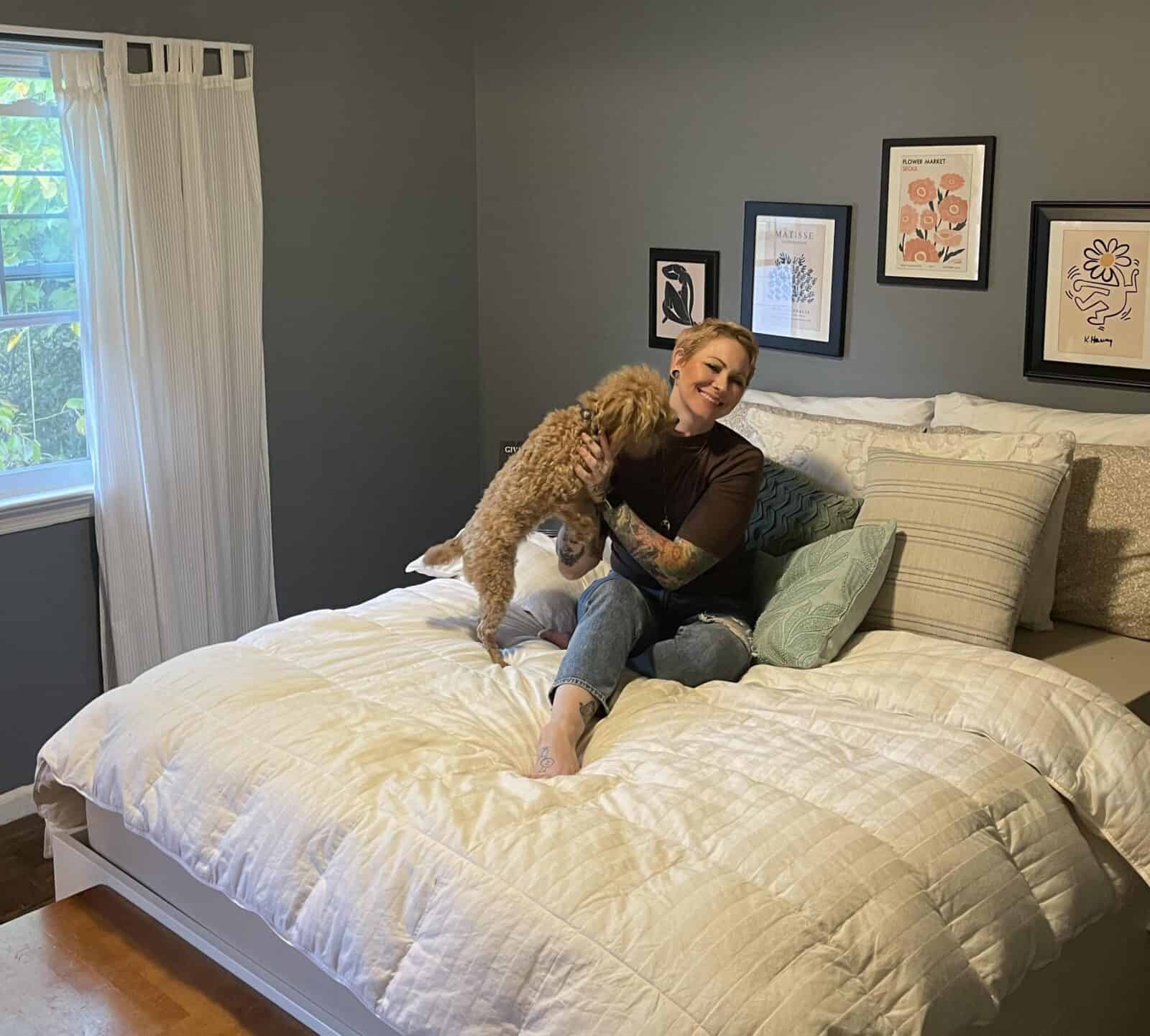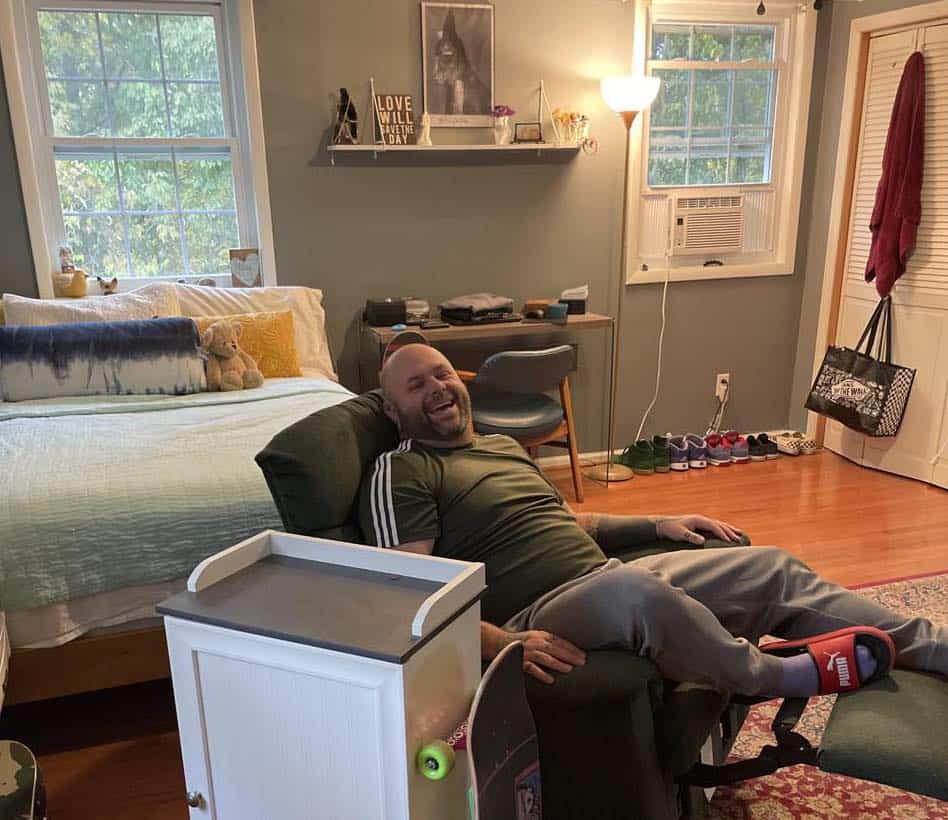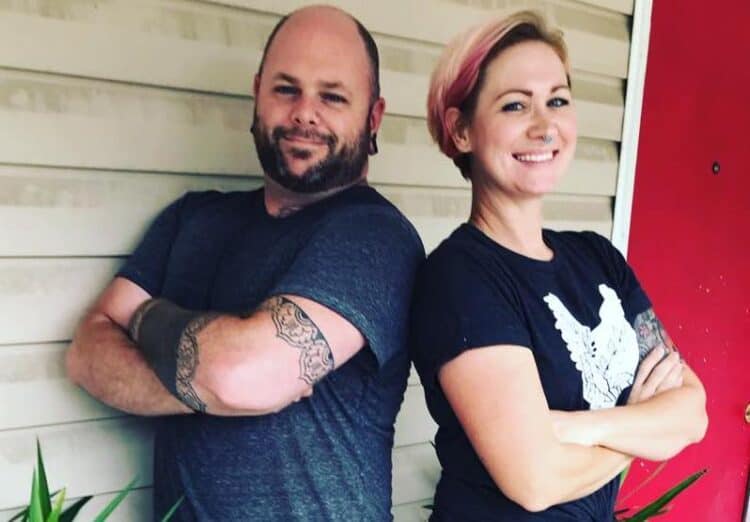If you’ve ever lain awake while listening to your partner’s snoring or played a drowsy game of tug-of-war with the duvet for eight hours straight, then perhaps you’ve considered a “sleep divorce”– the term used to describe happy partners who choose to get their Zzz’s in separate beds.
It’s a scenario that’s far more common than you might think. In fact, approximately 25% of couples currently sleep in separate beds, but the arrangement seems rarer than it is because most people don’t feel comfortable talking about it in public.
But Dustin Lynch, 41, and Emily Walker, 36, of Chattanooga, Tennessee, aren’t “most people.” They agreed to speak to us about why a sleep divorce was the right choice for them.
Hi, guys! Can you start by telling me how long you’ve been together?
Dustin: We’ve been together about four years. We aren’t married, but we call each other husband and wife. We’re also a blended family – Emily has a 15-year-old son and I have an 8-year-old daughter.
Emily: We own a house together and do everything that husbands and wives do, we just haven’t legally married. We’re basically in a long-term engagement.
When and why did you start sleeping in separate beds?
Dustin: We started sleeping in separate beds – but in the same room – about 1.5 years ago. We went on vacation and our hotel room had two beds in it. Emily slept in one, and I slept in the other. Then we were like, “that wasn’t horrible!” Our bedroom at home was really big, and we also happened to have a spare bed hanging around, so I suggested we try the two-bed thing when we got home. We did it, and it worked well.

Then you moved to two separate bedrooms. What prompted that decision?
Dustin: My mother had lived with us, and when she passed away in February 2023, that opened up a bedroom. Then one day, Emily said she was moving out of our bedroom and into that one! That was a few months ago.
Emily: Dustin has glazed over the fact that he snores like a freight train. He has a CPAP machine that he doesn’t wear all the time because it’s uncomfortable – and when he didn’t want to wear it, I wouldn’t get any sleep. Now that we’re in separate bedrooms, it doesn’t matter if he wears the CPAP machine or not. We’re on different ends of the house, so he can just live his best life.
Another bonus is that my new bedroom has a bathroom in it. The other one doesn’t, even though we call it the master bedroom, because it’s actually an add-on to the living room.
Dustin: Emily also sleeps like a mummy. She goes to bed and doesn’t move all night long, whereas I toss and turn all night long. Plus we have dogs that like to sleep in the bed. There was just a lot going on in our shared bed!
Emily: That’s true. I have a chronic pain disorder, so that’s where sleeping like a mummy comes from. I have to take medicine to fall asleep, and then I stay asleep (as long as no one is snoring next to me). I also don’t mind having all the dogs and cats in my bed! Dustin used to make them leave the bedroom at night and would shut the door behind them.

Are there notable differences between your bedrooms now?
Emily: I have an aesthetic, and Dustin doesn’t. If he could staple a towel to a window and call it a curtain, he would. My room smells like someone’s favorite aunt, or a warm hug. Dustin’s room smells like a foot, and like he used incense to try to cover it up.
Nothing in his room makes sense. He’s got a weird Barcalounger in there and a massive television. My bedroom has a down comforter and throw pillows. Everything matches, and it’s beautiful. That’s what I like to come home to. When I wake up in my beautiful bedroom, I don’t have to think about shoes scattered all over the place or stuff lying all over the floor. Dustin likes to come home to peace and quiet and a huge TV, so we both get to keep what we like.
Dustin: It’s true, Emily’s room looks like something from “Better Homes and Gardens” or “Good Housekeeping.”
Emily: Even our mattresses are different. Mine doesn’t have much bounce to it, which isn’t good for Dustin because he’s old! When we went mattress shopping, it was like “Goldilocks and the Three Bears” to try to find something we both liked.
Dustin: No, that’s not true. Emily’s bed is too soft, not too hard! The problem is, she’s like a feather so she gets on it and nothing happens. I get on it and it eats me whole.
Has sleeping in separate beds helped the emotional part of your relationship?
Emily: Honestly, yes. When Dustin used to snore next to me, I wanted to choke him out. There’s actually a meme about it, someone yelling about how much sleep they got after a night of snoring.
On a sweeter note, Dustin tucks me into bed at night now, and I love that. We leave for work at different times in the morning, so instead of kissing me goodbye he kisses me goodnight. We never miss that moment; it happens every night.
Dustin: It also opens up other playful avenues. She’ll text me and say, “are you going to come tuck me in?” So, I’ll come in and give her a hug and a kiss. It seems cheesy, but sometimes I’ll lay in bed and text her, “what are you doing in there?” Or I’ll ask if she wants to come watch a movie. It’s fun because it makes ordinary things special. Everyone watches movies with their partner, but it hits differently this way.
So, there was no pushback when you started this? Neither of you were offended that the other person didn’t want to share a bed anymore?
Emily: Nope. We’re secure enough in our own selves that we see each other as a bonus. We don’t have to be together all the time; we don’t lose anything when we separate to go to bed at night.
Dustin: This situation really does meet our needs. Sometimes you just want to retreat, especially when you have kids and dogs and cats and work. There’s no disrespect to each other if we just want to go to our own bedrooms and be left alone. It gives us the opportunity to have our own space, but also have our space together. We can also have sex in more places now!
Is there anything else you would like to share?
Emily: I feel like, on the one hand, if you’re really, really good at compromise then you can share a room and a bedtime and a bed and an aesthetic. But if you don’t feel like making your entire relationship about compromise, you don’t have to. With our situation, I get to keep my personality; I don’t have to meld it with his or lose part of myself. I still get to do my own thing, and I think that sometimes gets lost in relationships. So, I’m grateful for that.
Dustin: I would say that if you’re in a relationship with someone you love and trust, don’t be afraid to communicate what you want – even if you think it’s weird. I can see where someone might feel intimidated to tell their partner they’d like to sleep in another room, but it’s all about your approach and your delivery. Just communicate those things and don’t be afraid to think outside the box, because the solution might not look the way you think it will. Don’t be afraid to have those tough conversations and let each other know what you need.
Separate beds = better sex
Dr. Kristie Overstreet is a clinical sexologist, certified sex therapist, psychotherapist, author, speaker, and podcast host. She also happens to know a thing or two about the benefits of sleeping in separate beds.
While noting that couples can get better quality sleep when they sleep alone, she also echoed something that Dustin and Emily discovered a long time ago: the sex can be better when partners sleep in different beds.
“Sleeping in separate beds can make sex more purposeful and intentional. You’re not depending on your partner being next to you and easily accessible, so it allows you to put effort and intention into initiating sex, which can bring you closer together,” she said.
Acknowledging that some people seem to view separate beds as a fast-track to breaking up, Overstreet reminded that there are plenty of people who sleep in the same bed and still split up.
“The focus must be on how a couple talks through the problems they face, and their commitment to take action on their behaviors. That’s what makes a difference – not whether they sleep in the same bed or not.”
Of course, effort has to be made in order to prevent issues that can arise from sleeping in different beds. This is especially true for couples that struggle with communication, according to Overstreet.
“Separate beds can make communication problems worse, giving couples an excuse not to talk about issues and go to bed without resolving conflicts,” she said.
Overstreet also stated that couples should make sure that physical actions such as hugging, cuddling, touching, and kissing are not affected by the choice to sleep in separate beds.
“Creating time for physical intimacy, including sex, is essential for the couple,” she noted.






